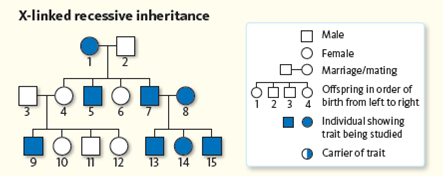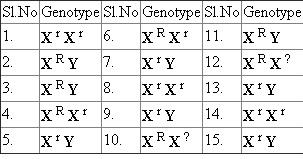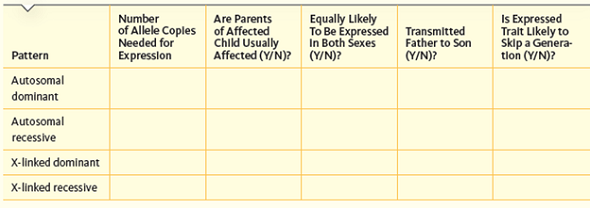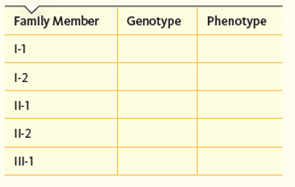Deck 18: Patterns of Inheritance
Question
Question
Question
Question
Question
Question
Question
Question
Question
Question
Question
Question
Question
Question
Question
Question
Question
Question
Question
Question
Question
Question
Question

Unlock Deck
Sign up to unlock the cards in this deck!
Unlock Deck
Unlock Deck
1/23
Play
Full screen (f)
Deck 18: Patterns of Inheritance
1
The following pedigree ( Fig. ) represents the inheritance of an X-Linked recessive trait.
a. Complete the genotype for each of the family members.
b. Why is there never any male-to-male transmission?
c. If a mother has the trait, what is the likelihood that her sons will have the trait? Why is this?
Figure Pedigree of an X-linked recessive inheritance.

a. Complete the genotype for each of the family members.
b. Why is there never any male-to-male transmission?
c. If a mother has the trait, what is the likelihood that her sons will have the trait? Why is this?
Figure Pedigree of an X-linked recessive inheritance.

a. The genotypes of each family member are listed as follows:
 b. The given pedigree is representing an X-linked recessive trait. The X-chromosome is passed onto the offspring by the mother. The father contributes Y-chromosome to the male offspring and X-chromosome to the female offspring. Thus, there will no male to male transfer of X-chromosome. Hence, the represented trait is never transmitted from male to male as it is an X-linked recessive trait.
b. The given pedigree is representing an X-linked recessive trait. The X-chromosome is passed onto the offspring by the mother. The father contributes Y-chromosome to the male offspring and X-chromosome to the female offspring. Thus, there will no male to male transfer of X-chromosome. Hence, the represented trait is never transmitted from male to male as it is an X-linked recessive trait.
c. The X-chromosome of the male offspring (XY) will be contributed by the mother. The represented trait is an X-linked recessive one. So, the X-linked recessive trait will surely be transmitted to the male offspring. Hence, if the mother possess such trait, she will 100% surely transmitted it to the male offspring.
 b. The given pedigree is representing an X-linked recessive trait. The X-chromosome is passed onto the offspring by the mother. The father contributes Y-chromosome to the male offspring and X-chromosome to the female offspring. Thus, there will no male to male transfer of X-chromosome. Hence, the represented trait is never transmitted from male to male as it is an X-linked recessive trait.
b. The given pedigree is representing an X-linked recessive trait. The X-chromosome is passed onto the offspring by the mother. The father contributes Y-chromosome to the male offspring and X-chromosome to the female offspring. Thus, there will no male to male transfer of X-chromosome. Hence, the represented trait is never transmitted from male to male as it is an X-linked recessive trait.c. The X-chromosome of the male offspring (XY) will be contributed by the mother. The represented trait is an X-linked recessive one. So, the X-linked recessive trait will surely be transmitted to the male offspring. Hence, if the mother possess such trait, she will 100% surely transmitted it to the male offspring.
2
Match each of the following gene terms with its characteristic, description, or example.


Gene: It is the region of DNA that encodes a functional protein. It is the molecular unit of heredity.
Hence, the correct option is (f) DNA sequence coding for a protein product.
Allele: Some genes have different forms that are located at the same position on a chromosome. Such different forms of a gene are called alleles.
Hence, the correct option is (b) alternate forms of a gene.
Heterozygous: A diploid organism or cell is referred as heterozygous when it contains two different alleles for a gene at a gene locus. Thus, the individual with two different alleles for a single trait is said to be heterozygous.
Hence, the correct option is (a) two different alleles for a particular gene.
Homozygous: The individual with two similar alleles (either dominant or recessive) for a single trait or gene at a gene locus is said to be homozygous.
Hence, the correct option is (e) two of the same alleles for a particular gene.
Dominant allele: At a gene locus, the phenotype of one allele masks the contribution of the second allele of the same gene. The allele that masks the other is said to be dominant. Thus, even a single copy of dominant allele gets expressed.
Hence, the correct option is (d) the allele that is preferentially expressed, even when only one copy is present.
Recessive allele: At a gene locus, the phenotype of one allele masks the contribution of the second allele of the same gene. The allele that gets masked by other is said to be recessive. Thus, the recessive allele gets expressed, only when two copies of it are present.
Hence, the correct option is (c) has no noticeable effect unless two alleles are present.
Hence, the correct option is (f) DNA sequence coding for a protein product.
Allele: Some genes have different forms that are located at the same position on a chromosome. Such different forms of a gene are called alleles.
Hence, the correct option is (b) alternate forms of a gene.
Heterozygous: A diploid organism or cell is referred as heterozygous when it contains two different alleles for a gene at a gene locus. Thus, the individual with two different alleles for a single trait is said to be heterozygous.
Hence, the correct option is (a) two different alleles for a particular gene.
Homozygous: The individual with two similar alleles (either dominant or recessive) for a single trait or gene at a gene locus is said to be homozygous.
Hence, the correct option is (e) two of the same alleles for a particular gene.
Dominant allele: At a gene locus, the phenotype of one allele masks the contribution of the second allele of the same gene. The allele that masks the other is said to be dominant. Thus, even a single copy of dominant allele gets expressed.
Hence, the correct option is (d) the allele that is preferentially expressed, even when only one copy is present.
Recessive allele: At a gene locus, the phenotype of one allele masks the contribution of the second allele of the same gene. The allele that gets masked by other is said to be recessive. Thus, the recessive allele gets expressed, only when two copies of it are present.
Hence, the correct option is (c) has no noticeable effect unless two alleles are present.
3
Complete the following table, which summarizes some of the characteristics of the common patterns of inheritance.


The following table summarizes some of the characteristics of the common inheritance patterns.


4
Match each of the following genetic terms with its characteristic or description.



Unlock Deck
Unlock for access to all 23 flashcards in this deck.
Unlock Deck
k this deck
5
What pattern of inheritance does this disorder follow?

Unlock Deck
Unlock for access to all 23 flashcards in this deck.
Unlock Deck
k this deck
6
Which of the following statements regarding sexual reproduction is not true?
A) Meiosis and fertilization increase genetic variation.
B) Each parent contributes half of the genetic material to the resulting offspring.
C) Sexual reproduction costs the organism less energy to produce large numbers of offspring.
D) Sexual reproduction includes the fusion of gametes and genetic information.
E) Sexual reproduction includes meiosis (gamete formation) and the fertilization of gametes.
A) Meiosis and fertilization increase genetic variation.
B) Each parent contributes half of the genetic material to the resulting offspring.
C) Sexual reproduction costs the organism less energy to produce large numbers of offspring.
D) Sexual reproduction includes the fusion of gametes and genetic information.
E) Sexual reproduction includes meiosis (gamete formation) and the fertilization of gametes.

Unlock Deck
Unlock for access to all 23 flashcards in this deck.
Unlock Deck
k this deck
7
Using the letter "C" to represent the CF gene and normal, carrier, and cystic fibrosis, complete the table.



Unlock Deck
Unlock for access to all 23 flashcards in this deck.
Unlock Deck
k this deck
8
Albinism is a recessive trait. What is the outcome of a heterozygous normal-colored male crossed with an albino female?
A) all albino
B) half albino and half normal
C) all normal
D) 75% normal and 25% albino
E) 75% albino and 25% normal
A) all albino
B) half albino and half normal
C) all normal
D) 75% normal and 25% albino
E) 75% albino and 25% normal

Unlock Deck
Unlock for access to all 23 flashcards in this deck.
Unlock Deck
k this deck
9
If the original parents (I-1 and I-2) had another child, what would be the likelihood that the child would have cystic fibrosis?

Unlock Deck
Unlock for access to all 23 flashcards in this deck.
Unlock Deck
k this deck
10
Match each of the following patterns of inheritance with its characteristic, description, or example.



Unlock Deck
Unlock for access to all 23 flashcards in this deck.
Unlock Deck
k this deck
11
What are the possible genotypes for III-3 and III-4? Is there any chance they could have a child with cystic fibrosis? Explain your answer.

Unlock Deck
Unlock for access to all 23 flashcards in this deck.
Unlock Deck
k this deck
12
A mother has type A blood, and a father has type B blood. They have two children, one with type AB blood and the other with type O. What are the genotypes of the parents?
A) I A I A and I B I B
B) I A I i and I B i
C) I A I i and I B I B
D) I A I A and I B i
E) none of the above
A) I A I A and I B I B
B) I A I i and I B i
C) I A I i and I B I B
D) I A I A and I B i
E) none of the above

Unlock Deck
Unlock for access to all 23 flashcards in this deck.
Unlock Deck
k this deck
13
Imagine III-1 is expecting a child. The couple decides to go to genetic counseling to determine the likelihood of their child having cystic fibrosis. Although expensive, genetic testing for cystic fibrosis is available. As the genetic counselor, what would you recommend to the family?
a. Should III-1 be tested for the gene?
b. Should the baby's father be tested?
c. If the father is heterozygous, what is the likelihood of the child being affected?
a. Should III-1 be tested for the gene?
b. Should the baby's father be tested?
c. If the father is heterozygous, what is the likelihood of the child being affected?

Unlock Deck
Unlock for access to all 23 flashcards in this deck.
Unlock Deck
k this deck
14
Andalusian chickens show incomplete dominance in feather color. A cross between a black bird and a white bird results in a gray chicken. What ratio of offspring is expected when a black homozygote crosses with a white homozygote?
A) 1 black : 2 gray : 1 white
B) all gray
C) 3 black : 1 white
D) all black
E) 1 black : 1 gray : 1 white
A) 1 black : 2 gray : 1 white
B) all gray
C) 3 black : 1 white
D) all black
E) 1 black : 1 gray : 1 white

Unlock Deck
Unlock for access to all 23 flashcards in this deck.
Unlock Deck
k this deck
15
What if the father is homozygous dominant?

Unlock Deck
Unlock for access to all 23 flashcards in this deck.
Unlock Deck
k this deck
16
Match each of the following chromosome terms with its characteristic, description, or example.



Unlock Deck
Unlock for access to all 23 flashcards in this deck.
Unlock Deck
k this deck
17
Characteristics of X-linked recessive traits include which of the following?
A) In order to express the recessive trait, females must inherit two copies of the allele.
B) In order to express the X-linked recessive trait, males only need to inherit one copy.
C) All daughters from an affected father will carry the trait.
D) Sons from an affected male will never carry the recessive allele.
E) All of the above statements are true.
A) In order to express the recessive trait, females must inherit two copies of the allele.
B) In order to express the X-linked recessive trait, males only need to inherit one copy.
C) All daughters from an affected father will carry the trait.
D) Sons from an affected male will never carry the recessive allele.
E) All of the above statements are true.

Unlock Deck
Unlock for access to all 23 flashcards in this deck.
Unlock Deck
k this deck
18
Inbreeding depression is the result of:
A) the unintentional concentration of undesirable traits while concentrating desired traits.
B) inheritance patterns from linked genes.
C) the loss of alleles from the gene pool.
D) continuous selective breeding in small populations.
E) all of the above.
A) the unintentional concentration of undesirable traits while concentrating desired traits.
B) inheritance patterns from linked genes.
C) the loss of alleles from the gene pool.
D) continuous selective breeding in small populations.
E) all of the above.

Unlock Deck
Unlock for access to all 23 flashcards in this deck.
Unlock Deck
k this deck
19
Like the domestication of many animals, the first individuals of the silver fox were selected based on
A) their interactions with humans (low fear).
B) physical traits such as size, speed, and coat color.
C) growth rate.
D) none of these traits.
E) all of these traits.
A) their interactions with humans (low fear).
B) physical traits such as size, speed, and coat color.
C) growth rate.
D) none of these traits.
E) all of these traits.

Unlock Deck
Unlock for access to all 23 flashcards in this deck.
Unlock Deck
k this deck
20
Match each of the following gene expression terms with its characteristic, description, or example.



Unlock Deck
Unlock for access to all 23 flashcards in this deck.
Unlock Deck
k this deck
21
Freckles are a dominant trait. Two parents, both with freckles, give birth to a child without freckles. What are the genotypes of the parents?

Unlock Deck
Unlock for access to all 23 flashcards in this deck.
Unlock Deck
k this deck
22
The Joneses are afraid there has been a mix-up at the birthing center of the hospital. Mr. Jones has type A blood and Mrs. Jones has type O blood. Use a Punnett square to predict what type of blood Baby Jones will have.

Unlock Deck
Unlock for access to all 23 flashcards in this deck.
Unlock Deck
k this deck
23
Which of the pedigrees below ( Fig. ) represents the inheritance pattern of a dominant trait? A recessive trait? Use the letter "A" to represent the dominant allele and "a" to represent the recessive allele and fill in the genotypes of as many individuals as you can.
Figure Pedigree analysis.
Phillip McClean. http://www.ndsu.nodak.edu/instruct/mcclean/plsc431/mendel/mendel9.htm

Figure Pedigree analysis.
Phillip McClean. http://www.ndsu.nodak.edu/instruct/mcclean/plsc431/mendel/mendel9.htm


Unlock Deck
Unlock for access to all 23 flashcards in this deck.
Unlock Deck
k this deck


